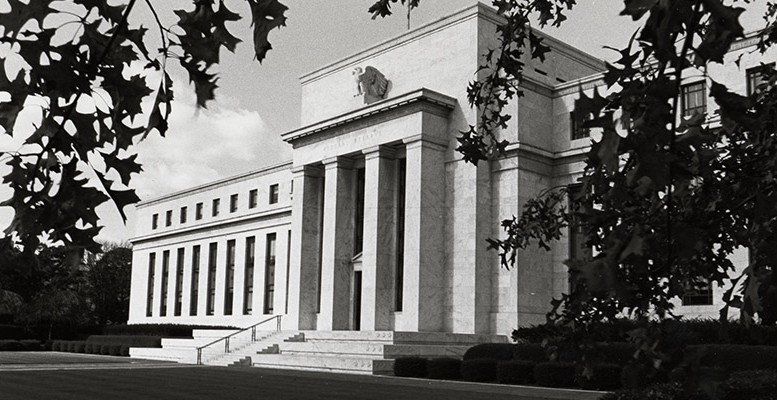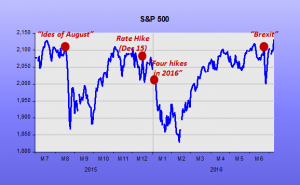James Alexander via Historinhas | Brexit is an irrelevance. So say US equities. In fact, if US equities say anything, they seem to think Brexit is a good thing if it means the Fed holds off from rate rises for longer. Bring it on!
What US equities don’t like is US monetary tightening when there is no call for it. Two recent sell-offs in US equities illustrate well this point.
In late 2014 the Fed indicated QE really would come to an end. By mid-2015 they were strongly indicating that “normalization” of rates, rate hikes, would occur soon, probably in September. This stance set off a sequence of events including a rapid Chinese stock market sell-off from June that spread to US equities and RoW equities by August. It became so bad that by the time of the September FOMC meeting rate rises were off the table and calm had returned.
Rather stubbornly the FOMC felt its credibility was so on the line about “normalization” that it had to raise rates some time in 2015 so it orchestrated one for the December meeting. It was fairly well-telegraphed and markets reacted calmly in the immediate aftermath, and it was Christmas anyway and no-one really wants a year-end sell-off. But the economic data which had been turning down continued to do poorly and come early January, when a key member of the FOMC with enormous overconfidence predicted four more hikes in 2016, the equity markets took fright.
Pretty quickly the Fed was back-pedalling and near-term rate hikes disappeared from the agenda by the late-January 2016 FOMC meeting, fully confirmed in the meeting in mid-March. Despite occasional harrumphing from FOMC members, regional ones in particular, and confusion around the outcome of the April FOMC meeting, there have been no more rate hikes.
Come late June and the UK Brexit vote, US stocks dipped but we have seen little of the earlier sell-offs. Maybe they are yet to come, though it will be hard to blame Brexit. US monetary policy is (nearly) everything, and the declines in market expectations of near-term rate hikes have, if anything, boosted US equities.
US bond markets are clearly far less sure. Longer term yields have fallen substantially, joining other quality bond markets in the march to zero yields and below. The longer term trends in NGDP are dull and likely to remain so with the Fed still biased to tighten.
To be fair, Brexit could have provided a much bigger shock. US NGDP growth is very low and in theory it shouldn’t take much of a shock to cause a rise in demand for money and the related reduction in spending and income. Perhaps the US Presidential election will cause it, or Putin playing games, or some incident in the South China Sea, or an Italian or German bank crisis. The surprise to many is just how resilient economies are to political shocks, or “regime uncertainty”.
What is certain is that the biggest shocks by far, and the ones that really stick, are monetary shocks caused by central banks mistakes.
*Image: Flickr






